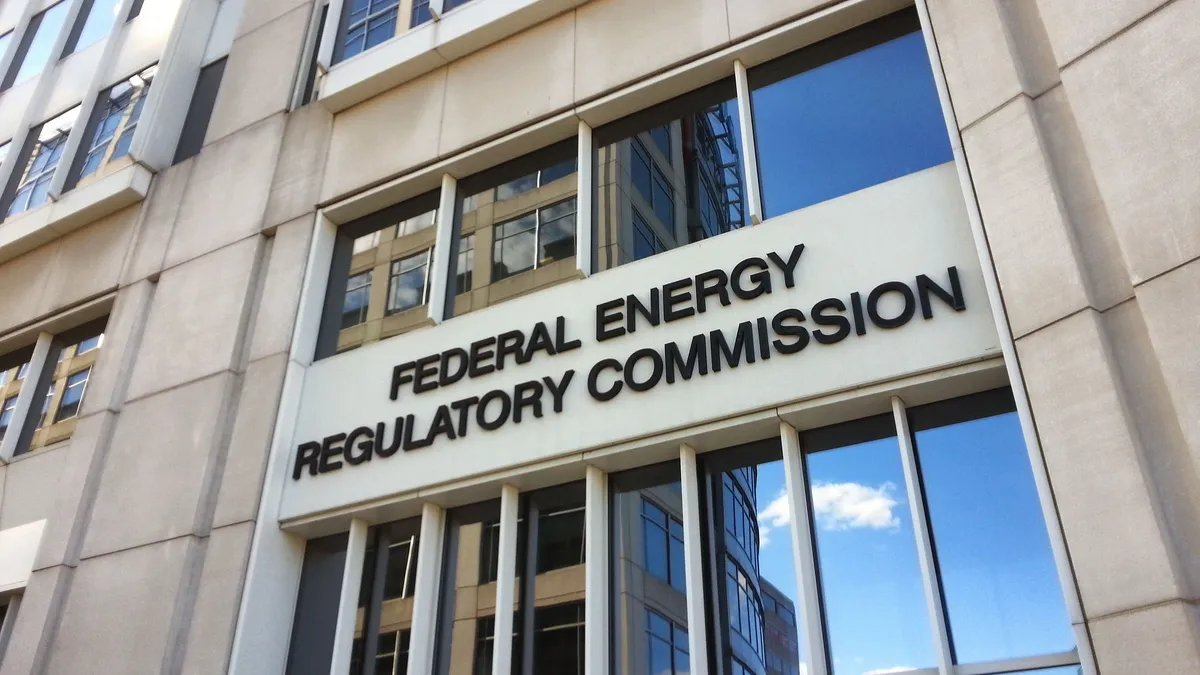Dive Brief:
-
The Federal Energy Regulatory Commission on Thursday asked stakeholders for comment on its transmission incentive policy and how it assigns rates of return for energy infrastructure projects in a lively monthly meeting.
-
Regulators also sparred again over climate change as they continue to struggle with how to account for the impacts of greenhouse gas emissions from energy infrastructure. Commissioner Cheryl LaFleur, the swing vote on natural gas projects, called FERC's current approach not "sustainable in the long term."
-
Chairman Neil Chatterjee also addressed the departure of his chief of staff, announced Wednesday, saying he was "not asked to leave," but offering no more detail on the terms of his exit. Stakeholders have 90 days to comment on the two Notices of Inquiry (NOIs).
Dive Insight:
Pointed exchanges over climate change policy at FERC's monthly meeting may indicate that approvals for new natural gas infrastructure are again on hold at the commission.
Last month, LaFleur sided with FERC's Republicans to approve the Calcasieu Pass liquefied natural gas export facility in Louisiana, the first in two years. Her vote was contingent on a compromise that saw FERC include estimates of greenhouse gas emissions from the facility in its order, but stop short of considering their significance.
LaFleur wrote the time that her position was a "first step" toward a fuller accounting of climate impacts. But on Thursday she pushed the commission to move beyond it, saying FERC has "been treating climate impacts differently than all the other environmental impacts that we look at in our environmental review."
"Commission staff has developed frameworks for grappling with every other identifiable and measurable impact," she said. "But we don't do that for climate change impacts. Instead we say we can't figure out how to do it and that's why we don't do more meaningful analysis in our orders. I don't believe that approach will be sustainable in the long term."
Commissioner Rich Glick, a fellow Democrat, routinely dissents from orders approving natural gas infrastructure and assailed the commission's climate policy in harsher tones.
"How can the commission determine that a project will not have a significant environmental impact if it refuses to examine whether the project will have a significant impact on the existential threat posed by climate change?" he said. "Other than your husband being shot and killed, Mrs. Lincoln, how was the play?"
Commissioner Bernie McNamee, a Republican credited with helping foster the Calcasieu compromise, pushed back on Glick's comments at the meeting.
"It's disappointing that in this town often if there's a is disagreement on how something should be done or what the conclusions are, that some will say that it wasn't done, that something was ignored" he said. "I would urge you to read the commission's order in Calcasieu Pass and realize that issues were addressed. They were seriously addressed. It was a hard look."
Glick sought to hammer his point home in a post-meeting press conference, a rarity for commissioners. Typically only the chairman takes questions from the press after monthly meetings.
"There's some sort of disconnect or they're not being 100% candid," Glick said of the Calcasieu majority.
"There is absolutely nothing in the order, the [environmental impact statement] or anything else in the record to suggest the commission has considered significance" of GHG emissions.
LaFleur said she would continue to evaluate gas infrastructure on a "case-by-case basis," but the commission did not approve any pipelines or LNG facilities at Thursday's meeting.
Transmission and ROE
The flap over climate change policy overshadowed a significant day for the commission as it opened two notices of inquiry — one over transmission incentives and another on how it sets return on equity for owners of transmission lines and gas pipelines.
Chatterjee last week said transmission investments could help enhance grid resilience, and FERC's NOI asks stakeholders to comment on the matter along with nearly a dozen other issues.
"If the Commission were to grant incentives for measures that enhance the resilience of the transmission system, what incentive(s) would be appropriate?" the NOI reads.
Transmission companies praised the NOI on incentives, saying it could push them to make investments that enhance existing lines.
"This initiative is important because there are new technologies and methods of delivering more energy over the existing grid, yet transmission owners currently gain nothing from using them," Rob Gramlich, executive director of the Watt Coalition, a group of advanced transmission vendors, wrote in an email.
Alongside the incentive inquiry, the return on equity NOI will be the first time "in the modern era" that the commission has considered changes to how it determines ROE for infrastructure projects, Chatterjee said.
The NOI covers not only the rates paid to transmission owners, but oil and gas pipeline operators as well. The NOI covers eight questions, including whether FERC should apply the same ROE methodology to both transmission and pipeline infrastructure.
"If we are going to design the right approach we need to be certain the incentives are incentivizing something, or whether the investments would occur anyway," Glick warned. "In other words, we shouldn't be handing out FERC candy without receiving something beneficial in return."













